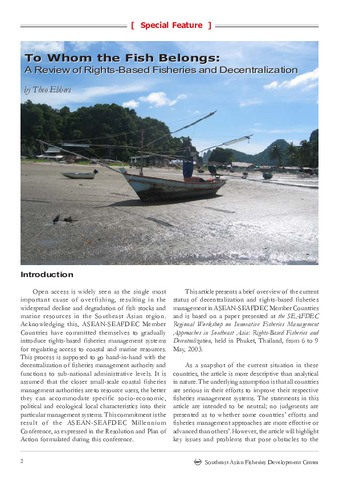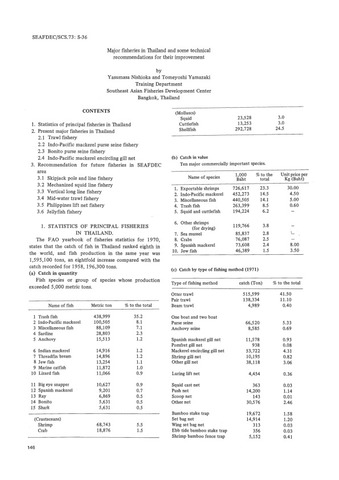အရာများအတွက် ရိုးရှင်းသော မှတ်တမ်းများကို ပြပါ။
To whom the fish belongs: A review of rights-based fisheries and decentralization
Share
| dc.contributor.author | Ebbers, Theo | |
| dc.date.accessioned | 2017-09-18T04:16:11Z | |
| dc.date.available | 2017-09-18T04:16:11Z | |
| dc.date.issued | 2003 | |
| dc.identifier.citation | Ebbers, T. (2003). To whom the fish belongs: A review of rights-based fisheries and decentralization. Fish for the People, 1(2), 2-18. | en |
| dc.identifier.issn | 1685-6546 | |
| dc.identifier.uri | http://hdl.handle.net/20.500.12066/671 | |
| dc.description.abstract | This article presents a brief overview of the current status of decentralization and rights-based fisheries management in ASEAN-SEAFDEC (Southeast Asian Fisheries Development Center) Member Countries and is based on a paper presented at the SEAFDEC Regional Workshop on Innovative Fisheries Management Approaches in Southeast Asia: Rights-Based Fisheries and Decentralization, held in Phuket, Thailand, from 6 to 9 May, 2003. As a snapshot of the current situation in these countries, the article is more descriptive than analytical in nature. The underlying assumption is that all countries are serious in their efforts to improve their respective fisheries management systems. The article highlights key issues and problems that pose obstacles to the establishment of responsible fisheries management systems. Potential approaches and actions to promote such fisheries management systems, characterized by functioning fishing and user rights arrangements, and governed by a decentralized management structure, are also put forward. This article is based on individual country reviews prepared by members of the SEAFDEC Working Group on Regional Fishery Policy (WGRFP). Thus, only those ASEAN-SEAFDEC Member Countries represented in the WGRFP are included in this review (Cambodia, Indonesia, Malaysia, Myanmar, Philippines, Thailand and Vietnam). Taking the recommendations of the Millennium Conference as the framework for the review, working group members developed a list of guiding questions, which were used for interviews with key informants in their respective countries during a two-week study tour. Each working group member interviewed senior-level fisheries policymakers and managers as well as resource-user representatives to draw a picture of the current situation of decentralization and rights-based fisheries in their respective countries. | en |
| dc.language.iso | en | en |
| dc.publisher | Secretariat, Southeast Asian Fisheries Development Center | en |
| dc.subject | Myanmar | en |
| dc.subject | Philippines | en |
| dc.subject | Cambodia | en |
| dc.subject | Thailand | en |
| dc.subject | Malaysia | en |
| dc.subject | Indonesia | en |
| dc.subject | Viet Nam | en |
| dc.title | To whom the fish belongs: A review of rights-based fisheries and decentralization | en |
| dc.type | magazineArticle | en |
| dc.citation.volume | 1 | |
| dc.citation.issue | 2 | |
| dc.citation.spage | 2 | |
| dc.citation.epage | 18 | |
| dc.citation.journalTitle | Fish for the People | en |
| dc.subject.asfa | Fishery policy | en |
| dc.subject.asfa | fishing rights | en |
| dc.subject.asfa | fishery management | en |
| dc.subject.asfa | Legal aspects | en |




